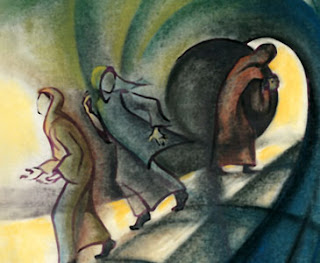
Luke 24:1-12 (Click here for text)
The confusion continues. Everyone is looking for Jesus in the wrong place! Of course it makes perfect sense to expect Jesus to conform to normal human standards - i.e. if he's dead to stay dead. The women, desperate to express their love and grief, have continued about their plans - why should they do any different? Peter, doesn't believe their tale and characteristically rushes over to see for himself and sees the grave linen but no body! He is confused - why shouldn't he be?
From the perspective of the angels, their confusion is ungrounded. Why? Because Jesus had told them very clearly what it is that would happen and what they were to expect. Despite the disciples fascination and even service to Jesus they clearly had not believed him. A couple of weeks ago my daughter was to visit us on holiday and needed to travel by train. We told here to book the ticket early because it would be a lot cheaper. She didn't, was charges excessively for her ticket and on arrival claimed that she didn't know. She had been told but had not had that personal experience that cements the expectation as part of her understanding.
This is the process of faith. Once we have come to terms with the fact that the tomb is empty, we then need to start believing what Jesus actually says! Jesus promises to be with us all until the end, he promises the Holy Spirit within us, He promises that we will continues to do the things he has started. When do we start believing in what He says? What does it take? Jesus seems to express his own frustration with this too when he says to Thomas, “Have you believed because you have seen me? Blessed are those who have not seen and yet have come to believe.”
Christian life really starts when we believe what Jesus actually says! It is then that the power of the resurrection becomes real for us.








